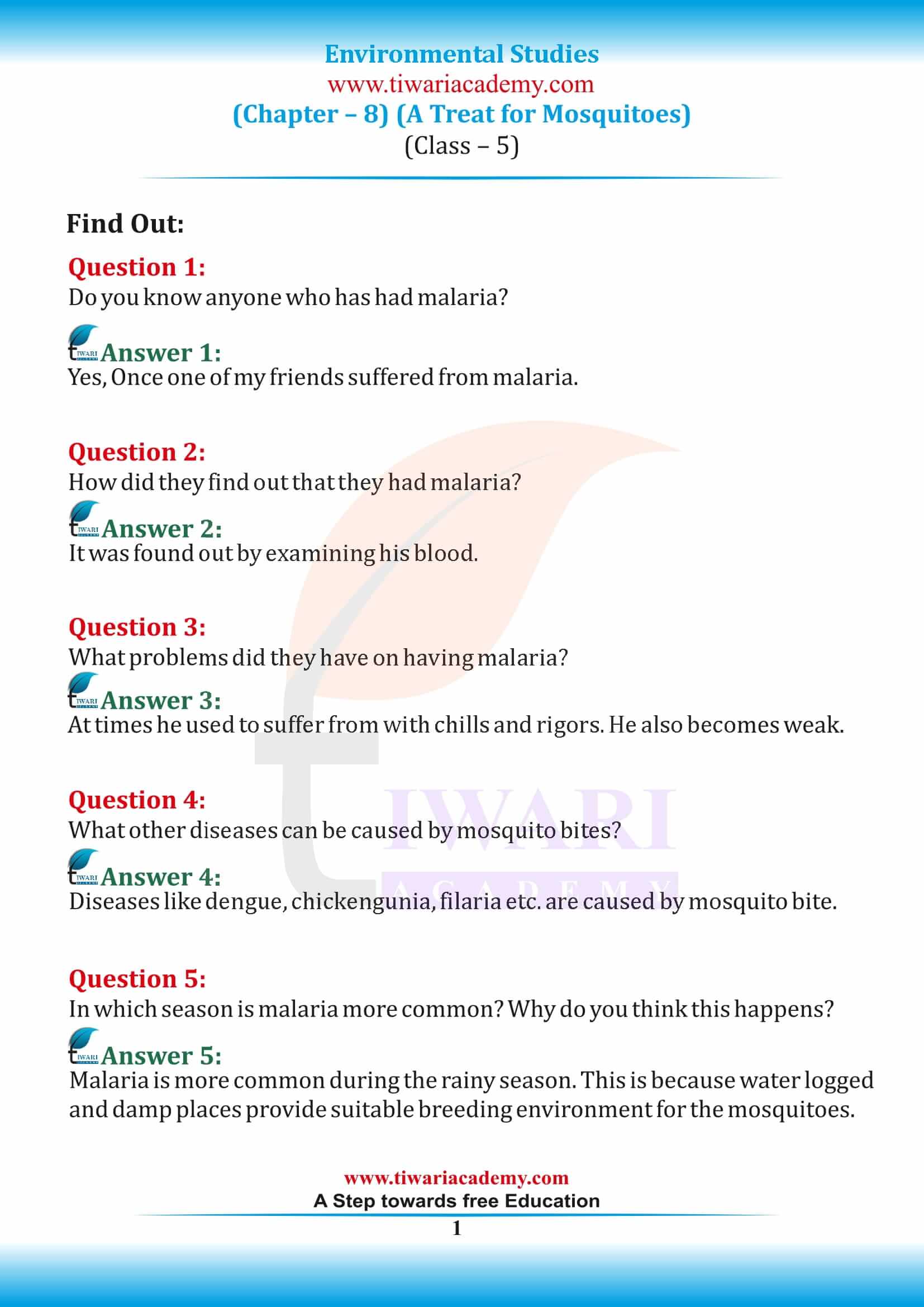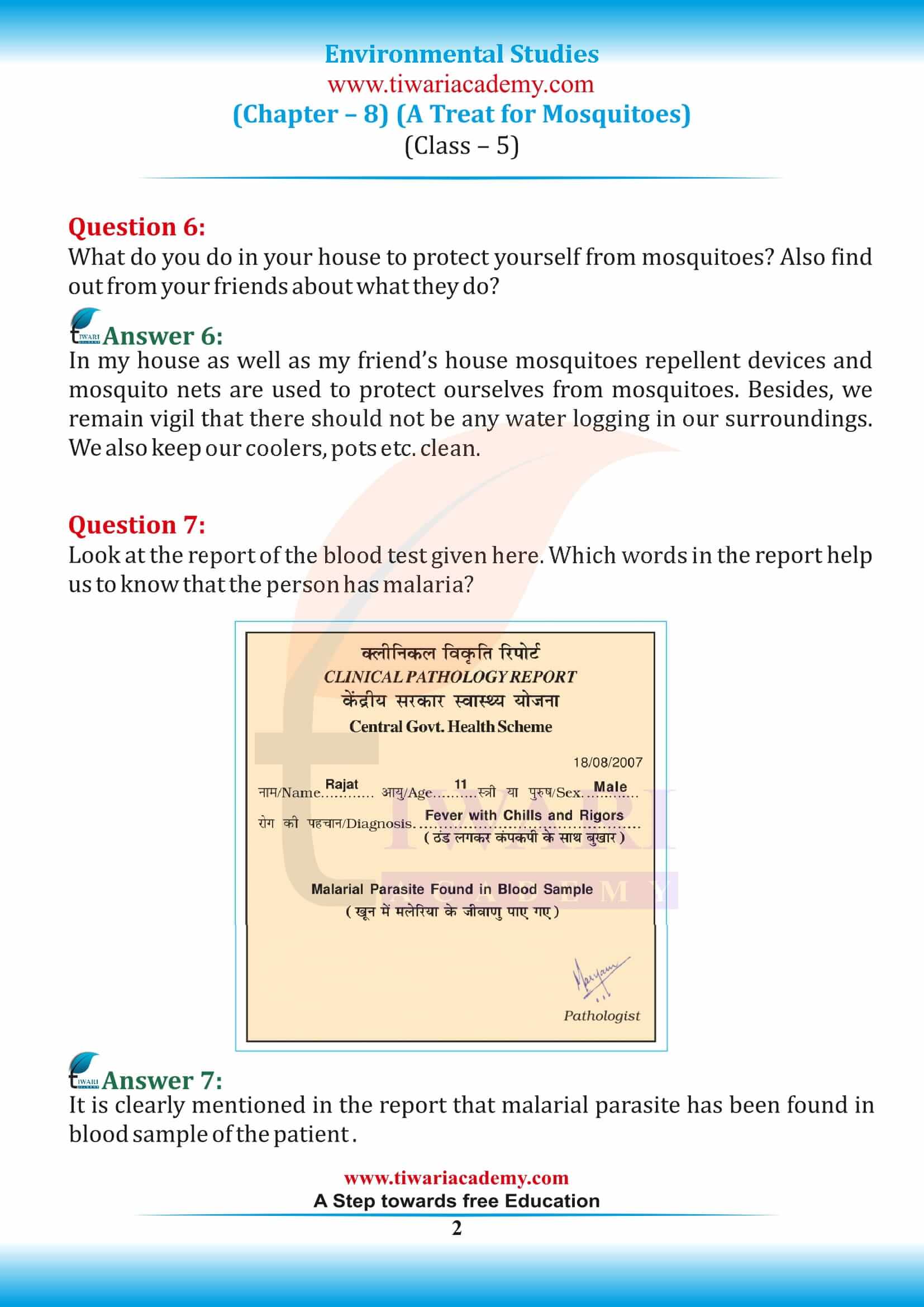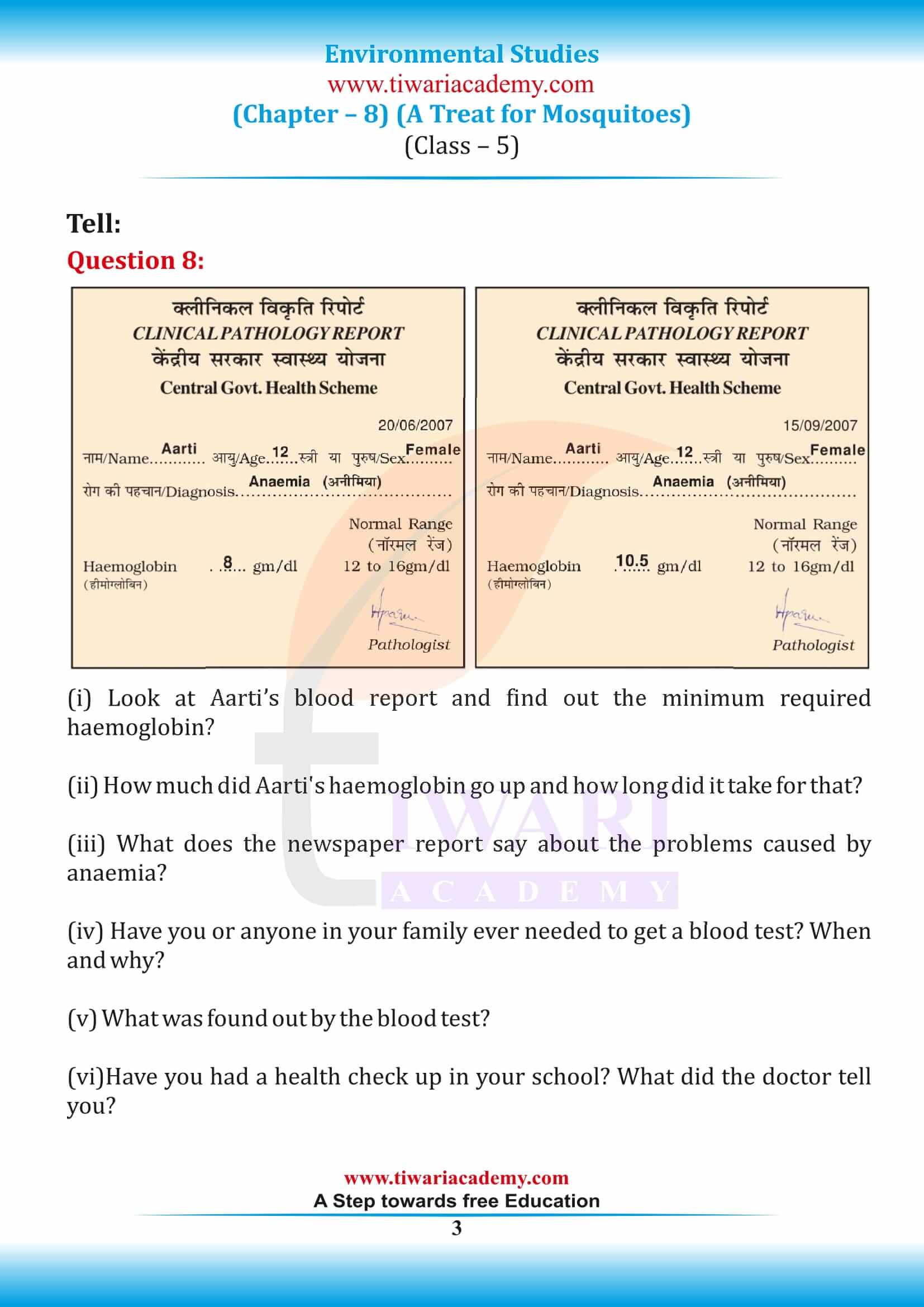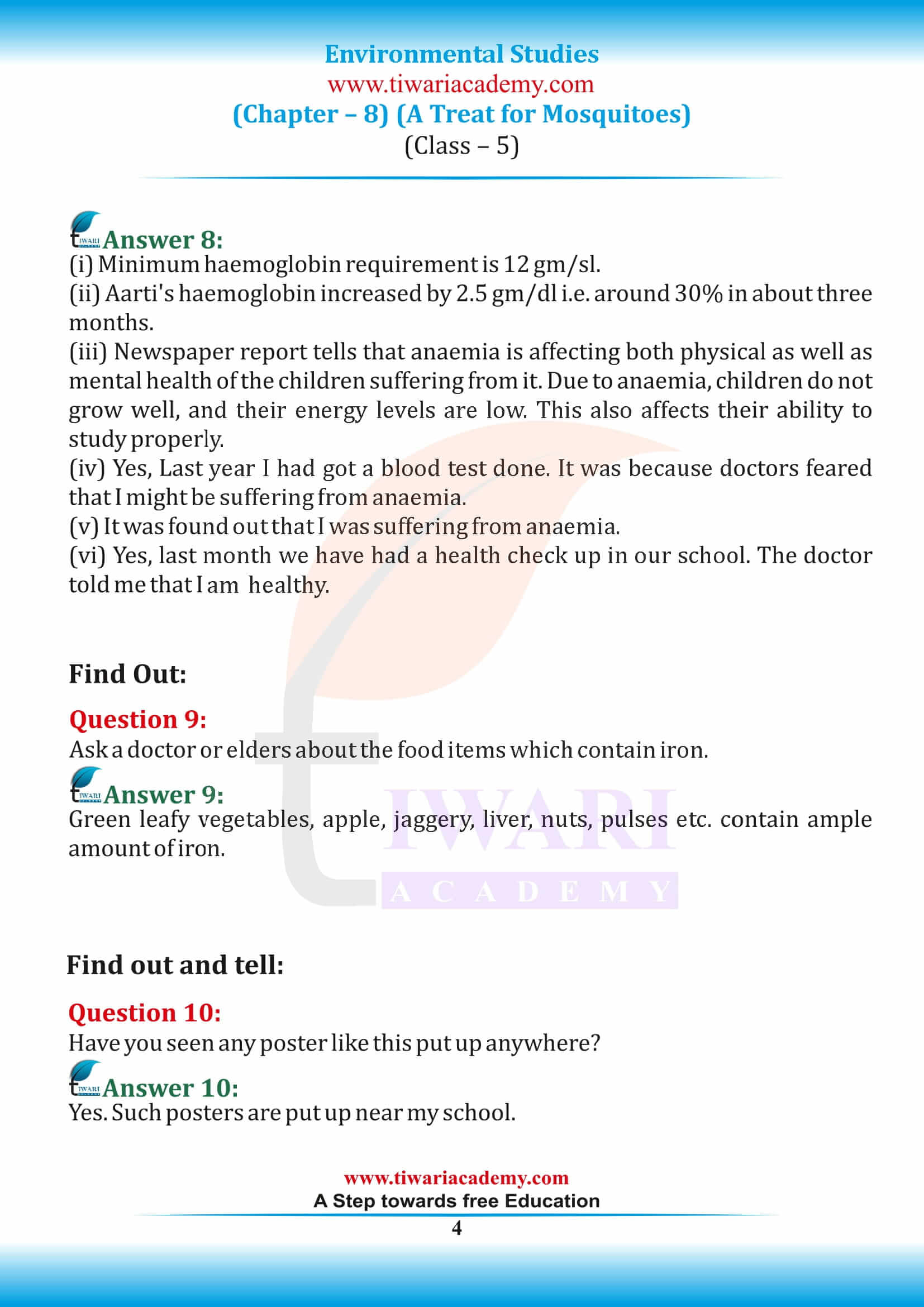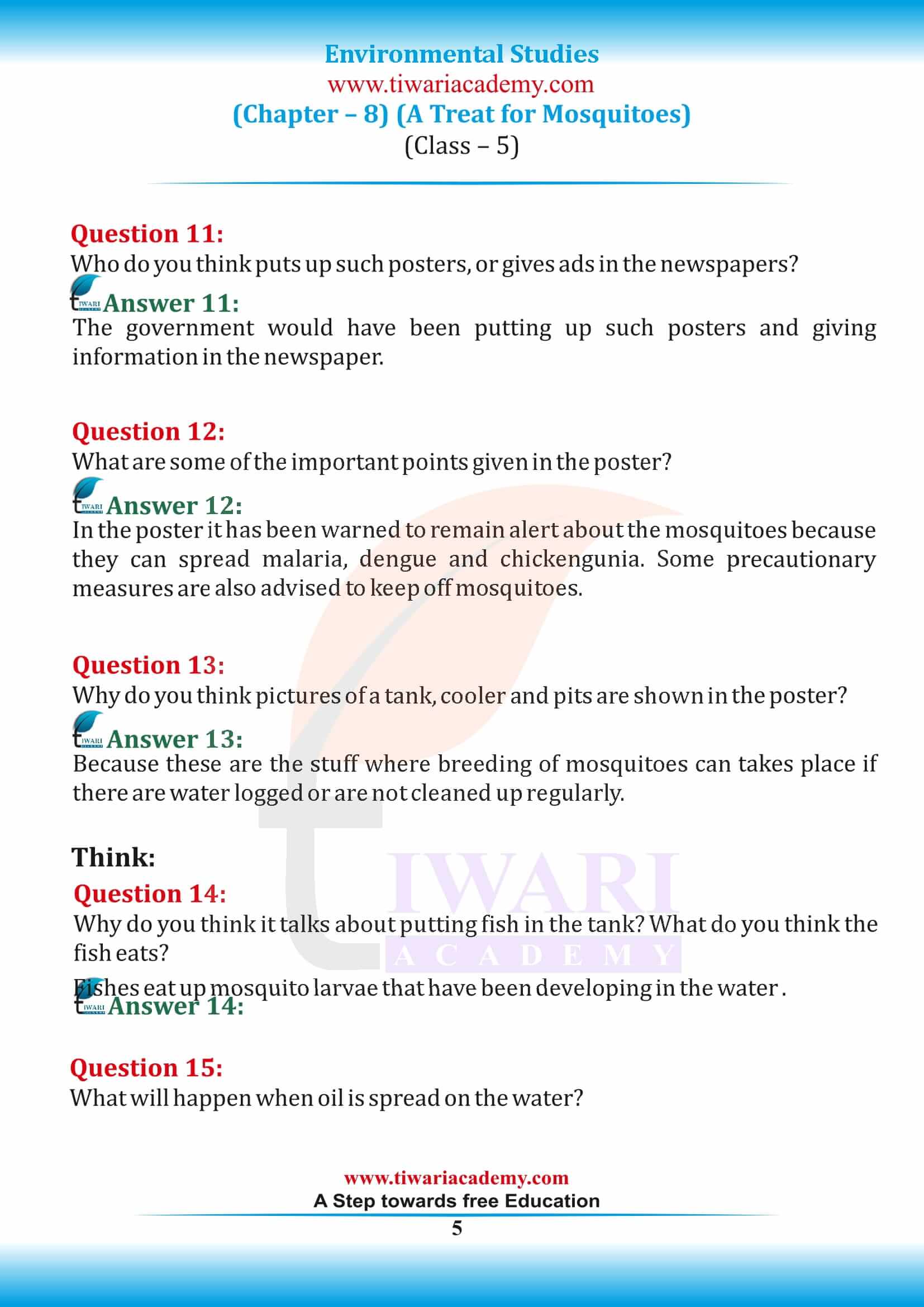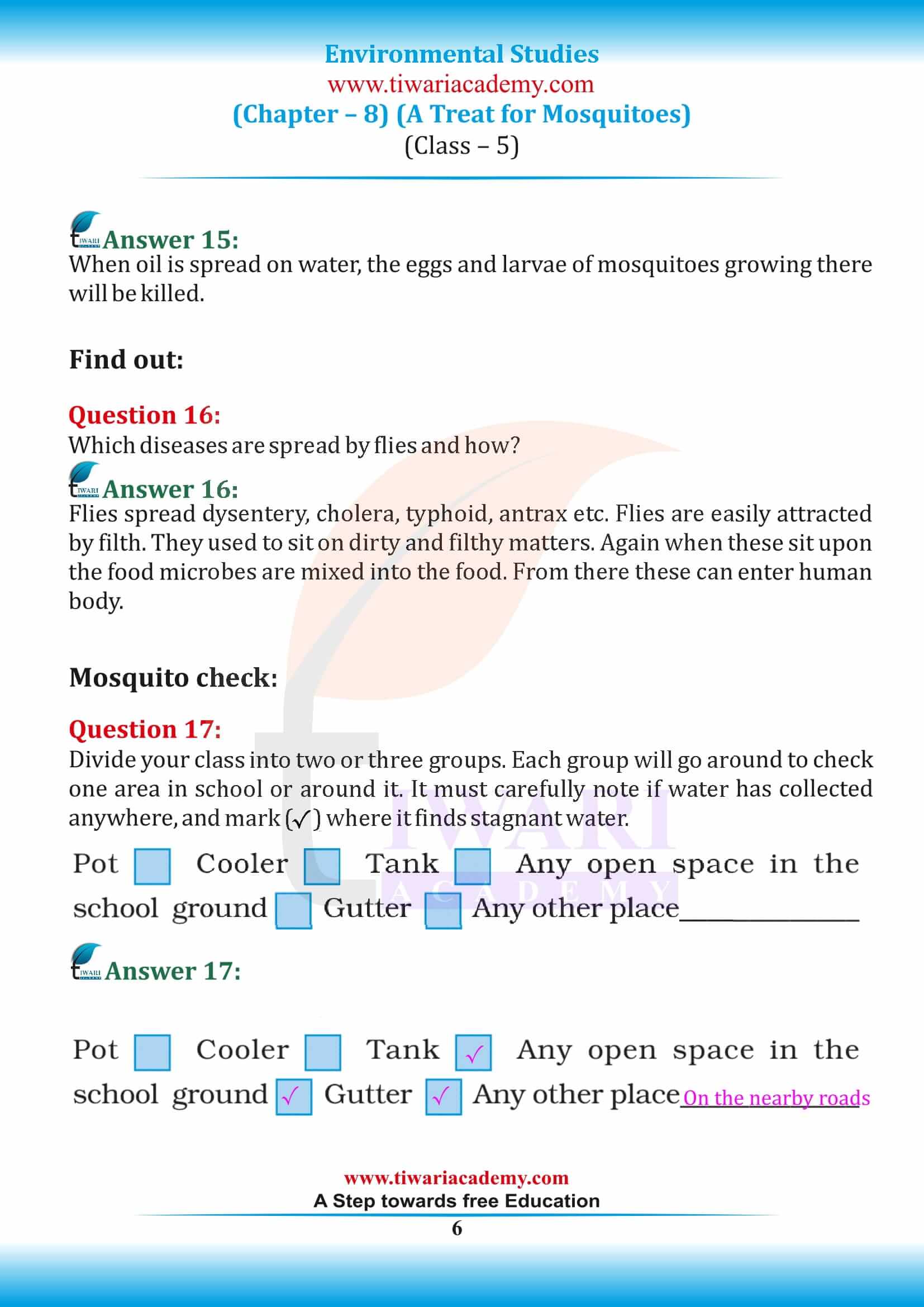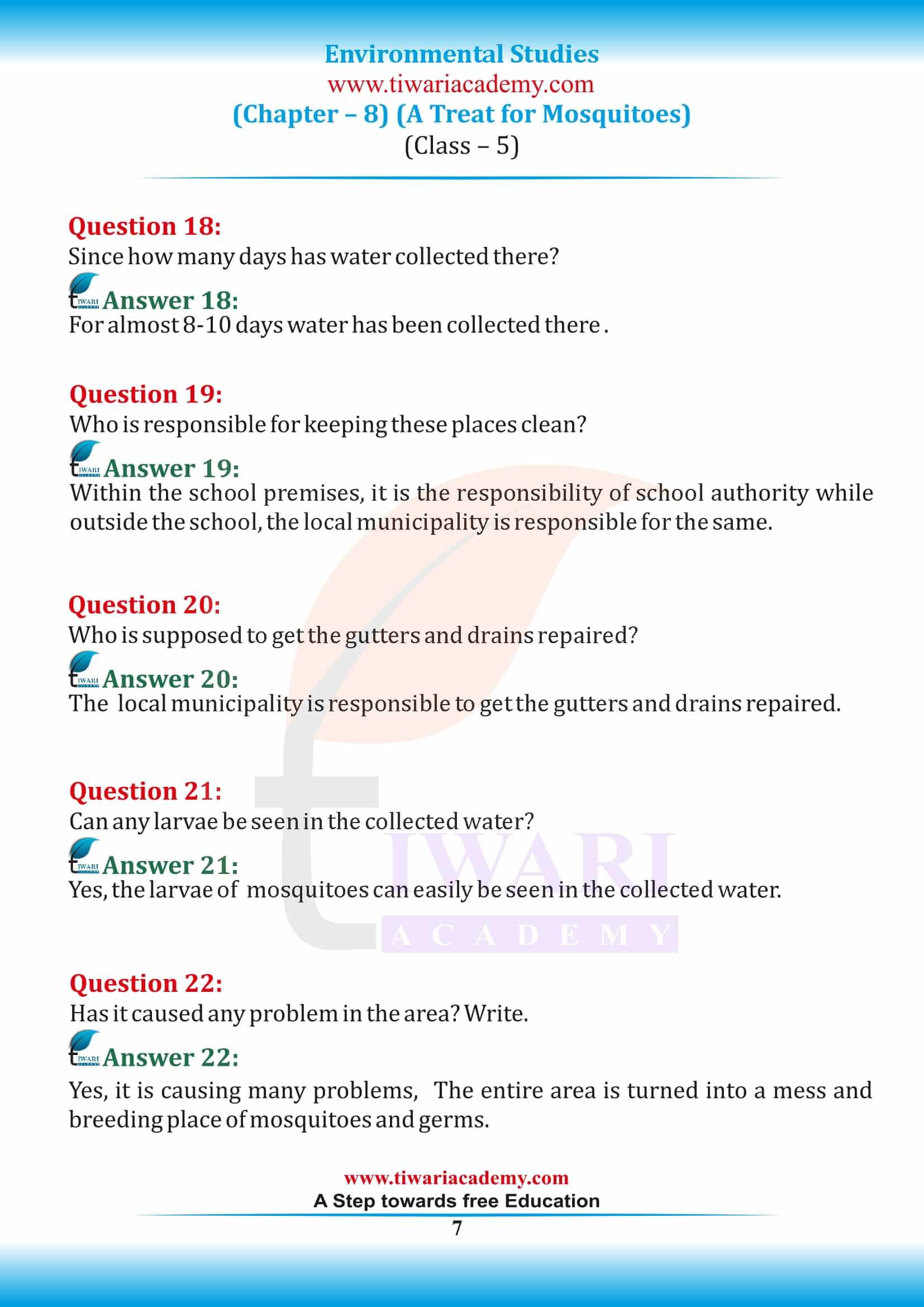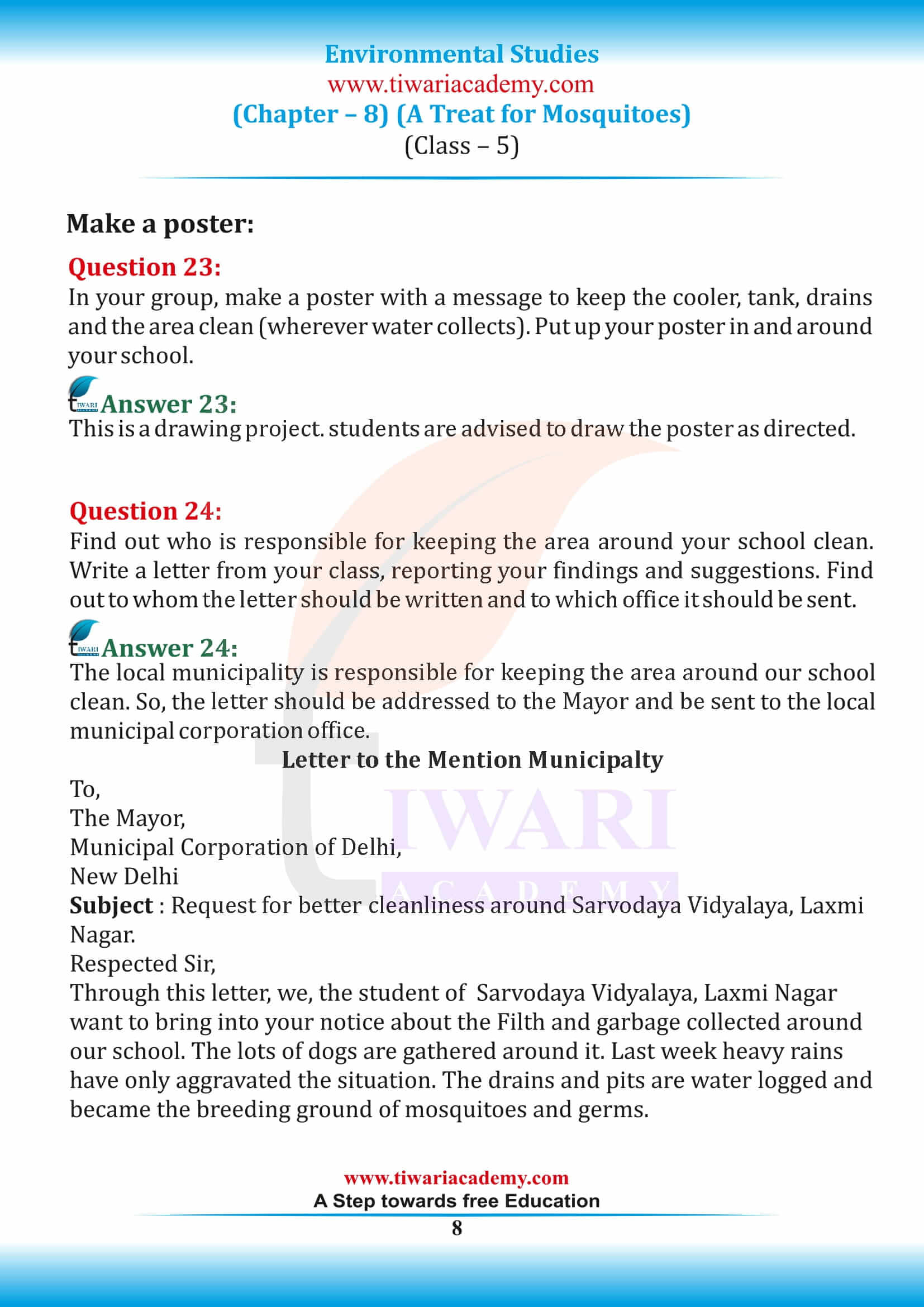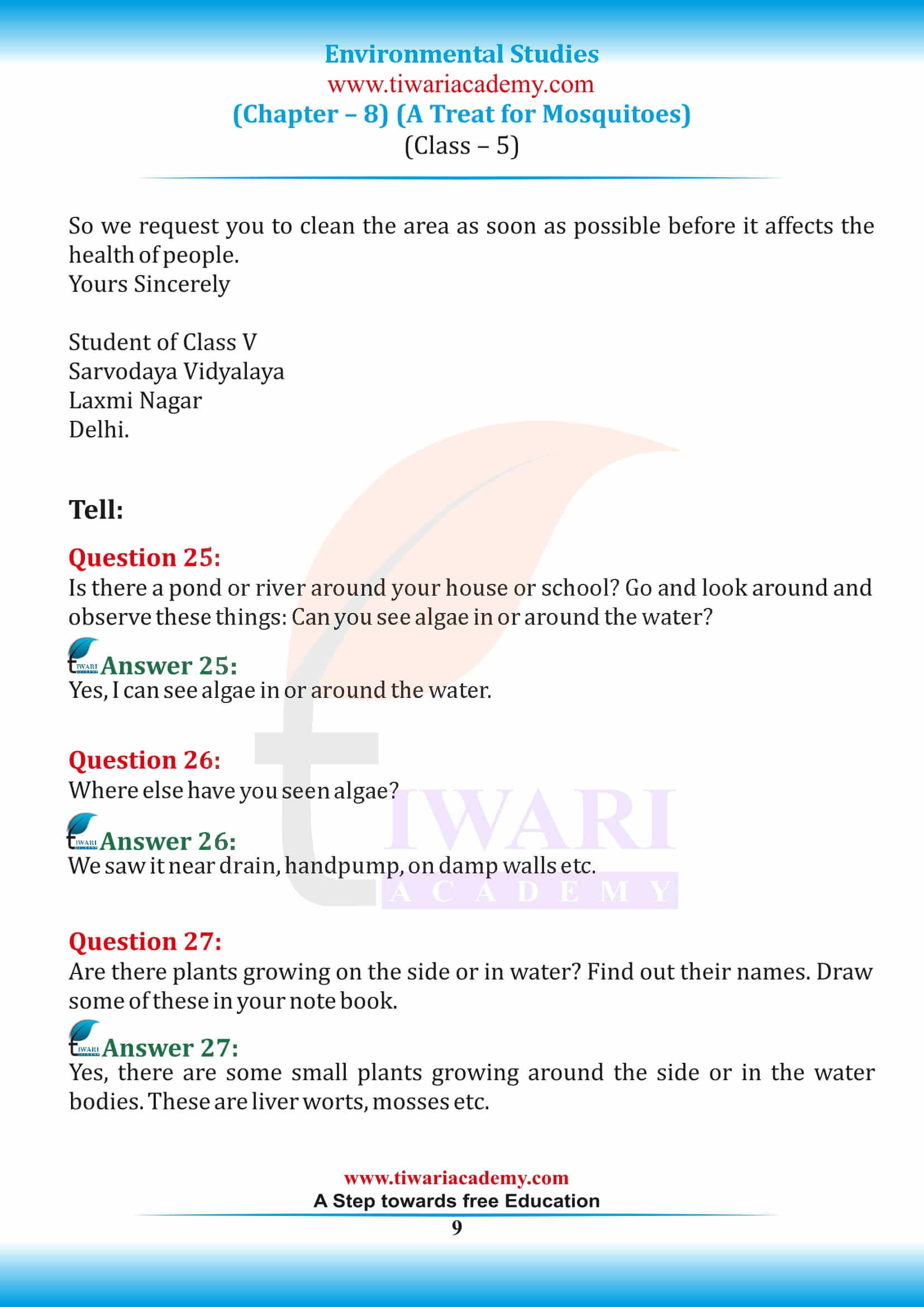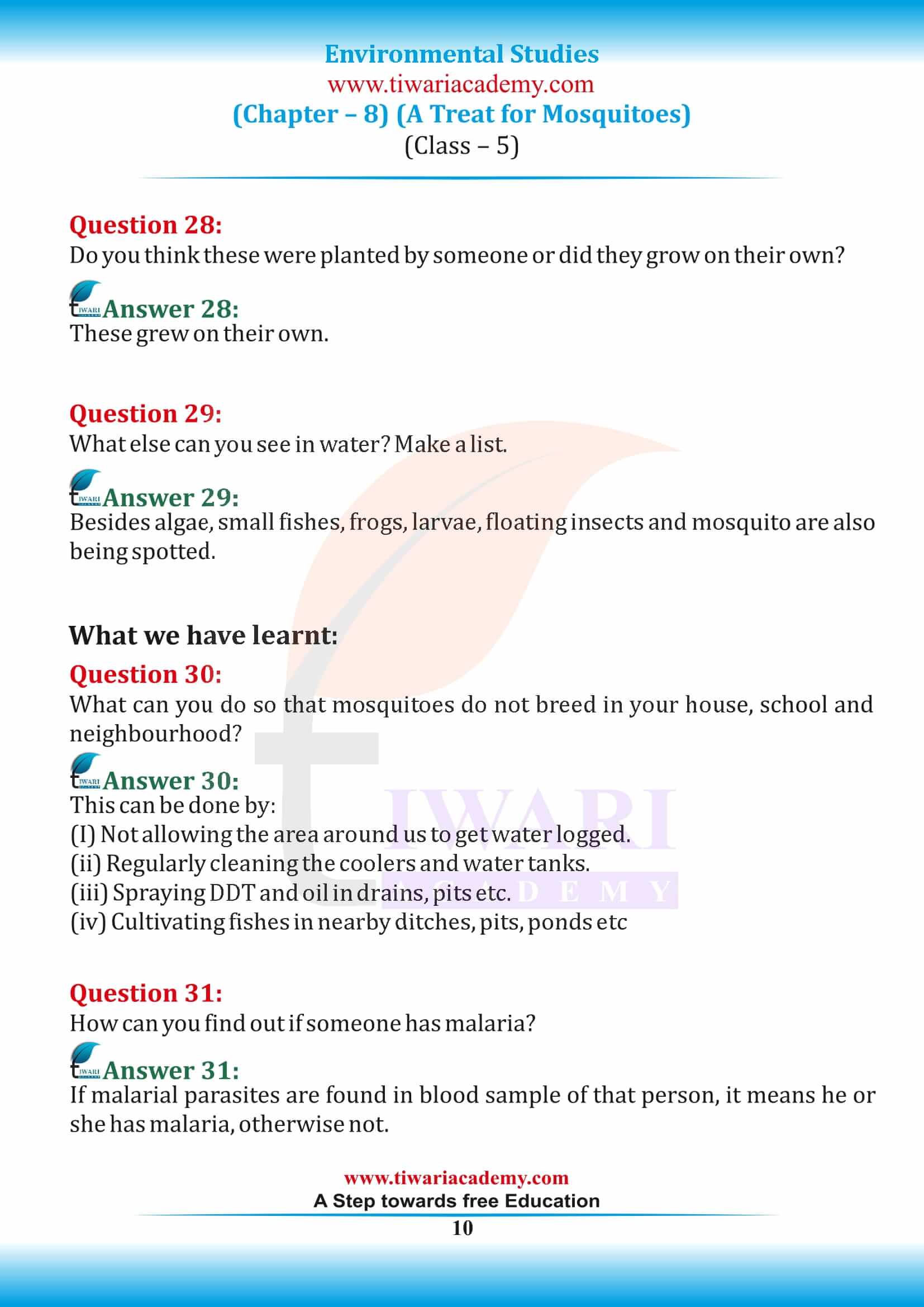NCERT Solutions for Class 5 EVS Chapter 8 A Treat for Mosquitoes in English and Hindi Medium updated for new CBSE Session 2025-26 free to use online. All the solutions of 5th EVS are given here with Extra Important questions, taken form NCERT Book, with complete explanation. So that student can easily prepare for school tests and terminal exams.
NCERT Solutions for Class 5 EVS Chapter 8
Class 5 EVS Chapter 8 Question Answers of A Treat for Mosquitoes
Class 5 EVS Chapter 8 Question Answers Set 1
What happens when a mosquito bites?
When a mosquito bites, it stabs the skin by using a special part of their mouth which sucks up blood. As the mosquito is feeding on humans, it injects saliva into the skin. The human body reacts to the saliva and this makes a bump and itching starts.
Write name of diseases caused due to mosquitoes?
The diseases caused by mosquitoes are- malaria, chikungunya virus, dengue.
What measures have to be taken to protect ourselves from Mosquitoes?
The measures that should be taken to prevent ourselves from mosquitoes are-
• Wearing a long as well as light-coloured clothing when we go outdoors, especially when mosquitoes are active.
• Using mosquito repellents, coils etc.
• Following the instructions of using mosquito repellent.
• Fitting proper mosquito nets on the doors and windows or beds of your house, on your tent and camping shelter
Last monsoon, Reema suffered from high fever with chills and shivers. After a blood test, the doctor advised her to take chloroquine tablets. i. Name the disease Reema is suffering from. ii. Why is it common during monsoon?
Reema is suffering from Malaria
Malaria is spread by Anopheles mosquitoes. This disease is common in rainy or monsoon season as there is a problem of water blockage or collection in many areas which makes it a breeding ground for mosquitoes at domestic and public surroundings. Mosquitoes breed in stagnant water.
Question:
Suggest some precautions that should be taken by us so that they are not affected by Malaria.
Answer:
Some measures that we can take to prevent us from malaria are:
- Applying mosquito repellents. Remember to reapply it frequently.
- Always use mosquito nets over the bed.
- Wear long sleeves clothes that cover your arms and legs completely.
- Close your doors and windows, especially during the evenings.
- Wear for loose-fitted clothes instead of tight ones.
- Stay indoors during the evenings.
- Do not allow water to collect at any place
- Empty water tanks, coolers etc to avoid stagnation of water
- Put kerosene oil if water gets collected somewhere especially in puddles etc.
- Don’t let water collect around your house. Fill up the pits.
- Keep the water pots, coolers and tanks clean. They should be dried every week.
- Spray kerosene if water has collected at some place.
Question:
Who has discovered Malaria causing mosquitos and when?
Answer:
On 20 August 1897, Ronal Ross made a discovery while dissecting the stomach tissue of an anopheles’ mosquito which had fed four days on a malarial patient. He found the malaria parasite, plasmodium and proved the role of anopheles’ mosquitoes in the transmitting malarial parasites in humans.
Class 5 EVS Chapter 8 Question Answers Set 2
What is malaria?
Malaria is a life-threatening disease which is transmitted by the bite of an infected Anopheles mosquito. The infected mosquitoes carry the Plasmodium parasite and when this mosquito bites you, the parasite is released into our bloodstream.
What symptoms does a malarial patient show? Ans.
The symptoms of a malarial patient are as follows-
• high fever
• shivering and chills.
• headaches.
• vomiting.
• muscle pains.
• diarrhoea.
• Nausea
• Convulsions(shaking)
• Sweating
What is a disease?
Disease is a condition when our body is unable to not function normally. A person who is suffering from a disease becomes sick and weak.
Disease can occur due to many different reasons. Diseases can be classified into two types – communicable disease and noncommunicable disease.
Question:
Differentiate between communicable and non-communicable diseases.
Answer:
| Communicable Diseases | Non-communicable diseases |
|---|---|
| Communicable diseases are the diseases which passes from one individual to another individual. | Non-communicable diseases are the diseases which does not spread from one person to another person. |
| These diseases are caused by pathogens like Virus, bacteria that are very infectious and vectors transmit these diseases. | These diseases can be caused due to allergies, malnutrition, illness due to internal factors, lifestyle changes, environmental changes, abnormalities. |
| Cannot pass from one generation to another | Can pass from one generation to another |
| As it can develop almost immediately, it is acute (serious) | As it develops over a period of time and lasts for long, it is chronic(continuing) |
| AIDS, Typhoid, Tuberculosis, Malaria, Cholera | Allergies, heart diseases, diabetes |
Class 5 EVS Chapter 8 Question Answers Set 3
How do mosquitoes locate human beings to bite?
Mosquitoes use different methods to find humans. They are attracted to the carbon dioxide which is emitted by the humans and other animals. They also use their receptors and vision to find other signals like the body heat, perspiration and skin odour to find their host.
Why should we not allow water to stagnate a one place?
We should not allow water to stagnate at one place near our house or in our neighbourhood because mosquitoes breed in stagnant water and these mosquitoes are the carriers of many diseases like malaria and dengue.
What is a Microscope?
A microscope is an instrument which is used to observe small objects, even cells. The image of the object gets magnified with the help of at least one lens in the microscope. This lens bends light toward the eye and makes the object appear larger than what it actually is.
Question:
Why does the government advise people to put kerosene oil in the water coolers and on stagnant water during the rainy season?
Answer:
The government advises people to put kerosene oil in the water tanks of coolers and on the stagnant water during the rainy seasons because kerosene oil prevents the breeding of mosquitoes that spread various diseases like malaria etc. It kills the larvae (eggs) of mosquitoes which they lay in stagnant water and thus stops their growth. Thus, the thin layer of oil on the top of the water prevents the breeding of the mosquitoes breeding in the following ways:
• When oil is poured on the water it stops the oxygen supply to the larvae to grow hence it kills them.
• The mosquito larvae in the water cannot enter the oil film with their breathing tube, and so drown and die,
• adult mosquitoes don’t lay eggs on the oiled water.
Class 5 EVS Chapter 8 Question Answers Set 4
Name the medicine given to the person suffering from malaria.
From early times, the dried and powdered bark of the Cinchona tree was used to make a medicine for malaria. Earlier people used to boil the bark powder and strain the water which was given to the patients suffering from malaria. Now a tablet called chloroquine is made from it and given to the patients.
How can we stop mosquitoes from breeding in water tanks?
Mosquitoes breed by laying eggs in stagnant water. We can keep them off by either covering or clearing out any stagnant water that is in our home. Buckets, coolers, and other containers must be regularly cleaned and checked for stagnant water.
Why are fish put in water tank or pond?
Fish are put in water tanks or ponds because the fish eats larvae of mosquitoes that develop in water and thus stops breeding of mosquitoes.
What are deficiency diseases?
A deficiency disease is a disease which is caused due to the lack of essential nutrients in the diet such as vitamins and minerals in the human body. For example- Vitamin B1 deficiency causes beriberi, lack of iron in the body can lead to anaemia.
What is a blood test?
A blood test is a test in which a sample of blood is taken from the body to be tested in a lab. Blood tests are done to check the levels of glucose, haemoglobin, or white blood cells. It helps to notice problems like a disease or a medical condition.
What is haemoglobin?
Haemoglobin is a protein in red blood cells which contains iron in it and is used to transport oxygen around the human body. Haemoglobin is found in the red blood cells of all vertebrates apart from white-blooded fish.
How do flies spread diseases even though they don’t bite us?
Flies can spread diseases because they feed freely both on human food and filthy matter. The fly picks up disease-causing organisms while crawling and feeding. They often sit on dead animals, rotten food, manure, garbage and trash. Because they frequent those places, they pick up and spread diseases that are harmful to human by sitting on the food we eat or surfaces by defecating on them.
What is anaemia?
Anaemia is deficiency of blood in a person. It happens when a person doesn’t have the normal amount of red blood cells or if the person is low on haemoglobin, a protein in red blood cells.
Class 5 EVS Chapter 8 Question Answers Set 5
Which food items help us to increase haemoglobin in blood?
It is important to take iron rich foods like green leafy vegetables, liver, tofu, spinach, eggs, whole grains, pulses and beans, meat, fish, dry fruits, jaggery and amla.
How does anaemia effect the children?
Anaemia is affecting both their physical as well as mental health of the children. Due to anaemia, children do not grow well, and their energy levels are low. This also affects their ability to study properly. Now health check -ups are being done in the schools and health cards are being made for all the children. Anaemic children are also being given iron tablets.
What is algae? Where does it grow?
Algae are aquatic, plant-like organisms. Algae can be found in oceans, lakes, rivers, ponds and even in snow, anywhere on earth. They are a type of plant-like living things that can make food from sunlight by photosynthesis. The algae spread a lot during the rainy season. Thus, algae are very small green plants that are found around the watery spots.
What is the normal range of haemoglobin of men and women?
The normal range of haemoglobin in men is – 13.5 to 17.5 grams
The normal range of haemoglobin in women is- 12.0 to 15.5 grams
Which diseases are spread by flies?
The diseases caused by flies are Typhoid fever. Dysentery. Cholera.
Give reason why it is advised not to eat cut or uncovered food items.
It is advised not to eat cut and uncovered food as such food is easily attacked by microorganisms, flies or insects which spread germs and act on them. They contaminate the food and if we eat that food, it can spread diseases and can lead to diseases like typhoid, dysentery etc. So, it is good to avoid them and eat healthy and hygienic food.
What does a blood test report tell?
A blood test report helps the doctors to know about the organs of a person, evaluate how well are the organs like the kidneys, liver, thyroid, and hear and are they working properly or not. It also helps to diagnose the disease a person is suffering from and know conditions such as cancer, HIV/AIDS, diabetes, anaemia and coronary heart disease. It helps the doctors to give treatment accordingly.
Question:
What is the cause of anemia?
Answer:
Deficiency of iron in the diet can cause anemia. Other causes of anemia can be dietary deficiency – lack of iron, vitamin B12 or folic acid in the diet. Mal absorption, where the body is not able to properly absorb or use the nutrients in the diet, can also cause anemia.
Class 5 EVS Chapter 8 Question Answers Set 6
Why do Mosquitoes breed in water?
Mosquitoes know that water can evaporate at a fast rate, so they regularly look for deep pools of water for laying their eggs. Mosquitoes usually lay eggs in shallow water which evaporates before their eggs hatch. Deep puddles and stagnant swamps are a mosquito’s favourite place to breed.
How do microscopes help doctors?
Microscope helps the doctors in examining the samples. They can exactly diagnose the type of microorganisms living in our body or the level of the different kinds of cells in the body.
What is a health check- up?
A health check -up helps us to find early signs of any health issues. When we go for a health check, the doctor checks our medical history, our family’s history of disease and our lifestyle, including your diet, weight, physical activity etc.
Why is a regular health check-up important?
A regular health check-up is important as it helps us to know are possible health condition at an early stage as prevention is always better than cure. Early finding of the disease or heath disorder always gives a better chance to fight against the disease without any kind of complication.
Question:
Read the statement and answer the questions-
Gaurav was feeling very weak, so he was advised to go for a blood test. The report showed his hemoglobin to be 8.5 gm/dl.
a) Name the disease which Gaurav is suffering from?
b) Which mineral is deficient in his body?
c) Suggest any three food items which would help him to increase the hemoglobin in his body?
Answer:
a. The disease from which Gaurav is suffering from is Anaemia
b. The mineral deficient in his body is Iron.
c. Three food items which would help him to increase the haemoglobin in his body are:
• whole-grain cereals
• eggs
• peanut butter
Class 5 EVS Chapter 8 Question Answers Set 7
Why should we keep the water pots, coolers and tanks clean and dried?
We should keep the water pots, coolers and tanks clean and dried because the mosquitoes breed in water logged and damp places especially in the rainy season. Therefore, we should ensure that we keep our coolers, pots clean by changing their water regularly.
How did Ross find out that malaria was spread by mosquitoes?
In those days, thousands of people were dying due to a disease, now called malaria. The disease was found in areas where there was a lot of rain, or in swampy places. People thought that the illness was caused by some poisonous gas that came from the dirty swampy areas. They gave it the name ‘malaria’ which means ‘bad air’. A doctor had seen tiny germs in the blood of one of the patients, when he observed it under a microscope. But he could not understand how these had got into the patient’s blood. Ross used to carry empty bottles and chase mosquito after mosquito and put the mosquitoes into a mosquito net in which had a patient of malaria. The mosquitoes would have a feast, biting these patients. The patients were paid one anna for allowing one mosquito to bite them. He used to cut open the mosquito’s stomach and peep into it and spend hours and hours over the microscope.
Once he himself also fell ill with malaria and had to spend months like this with the microscope. One day he caught a few mosquitoes that looked different. They were brownish with spotted wings. He looked into the stomach of one of the female mosquitoes and saw something black there. He saw that these were tiny germs that looked just like the ones that were found in the blood of malaria patients. This proved that mosquitoes did spread malaria.
What was Ross awarded with for his findings?
In December 1902, Ronald Ross was awarded the highest award for his discovery—the Nobel Prize for medicine he found for malaria.
How does the Plasmodium parasite cause malaria?
The malaria parasite enters the blood stream of a person and travels to the liver. When the parasite becomes mature, it leaves the liver and starts infecting red blood cells. Malaria is caused by a single-celled parasite of the species plasmodium. The parasite is transmitted to humans most commonly through mosquito bites.
Question:
What are the symptoms which an anaemic patient show?
Answer:
The symptoms which an anaemic patient shows are:
- Pale skin & eyes.
- Loss of energy & tiredness
- Headache
- Unusually rapid heartbeat while doing exercise.
- Shortness in breath.
Why does chapter 8 from class 5th EVS give such importance to mosquitoes?
Mosquitoes are such organisms that look small but they are a grave problem for the nation and they tried to share the information among the kids because the kids are more prone to mosquito-related diseases because they play outdoor.
Apart from Mosquitoes what are the other organism that you can check growing in your home as an experiment as per chapter 8th of class 5th EVS?
We have seen the mosquitoes growing in the glass of water and they helped us know how the mosquitoes grow from clean water. Similarly, we can see the frogs grow from eggs to tadpoles and then grown frogs. Though frogs are some organism which doesn’t give any problems.
Did you find chapter 8 of the 5th EVS discussion helpful about the disease?
I think the chapter sharing the information about the disease is very important as the children are mostly exposed to such dangers and not only in our country but other countries too and there is no cure that could eradicate the changes to get caught in such problems but to preserving oneself.
